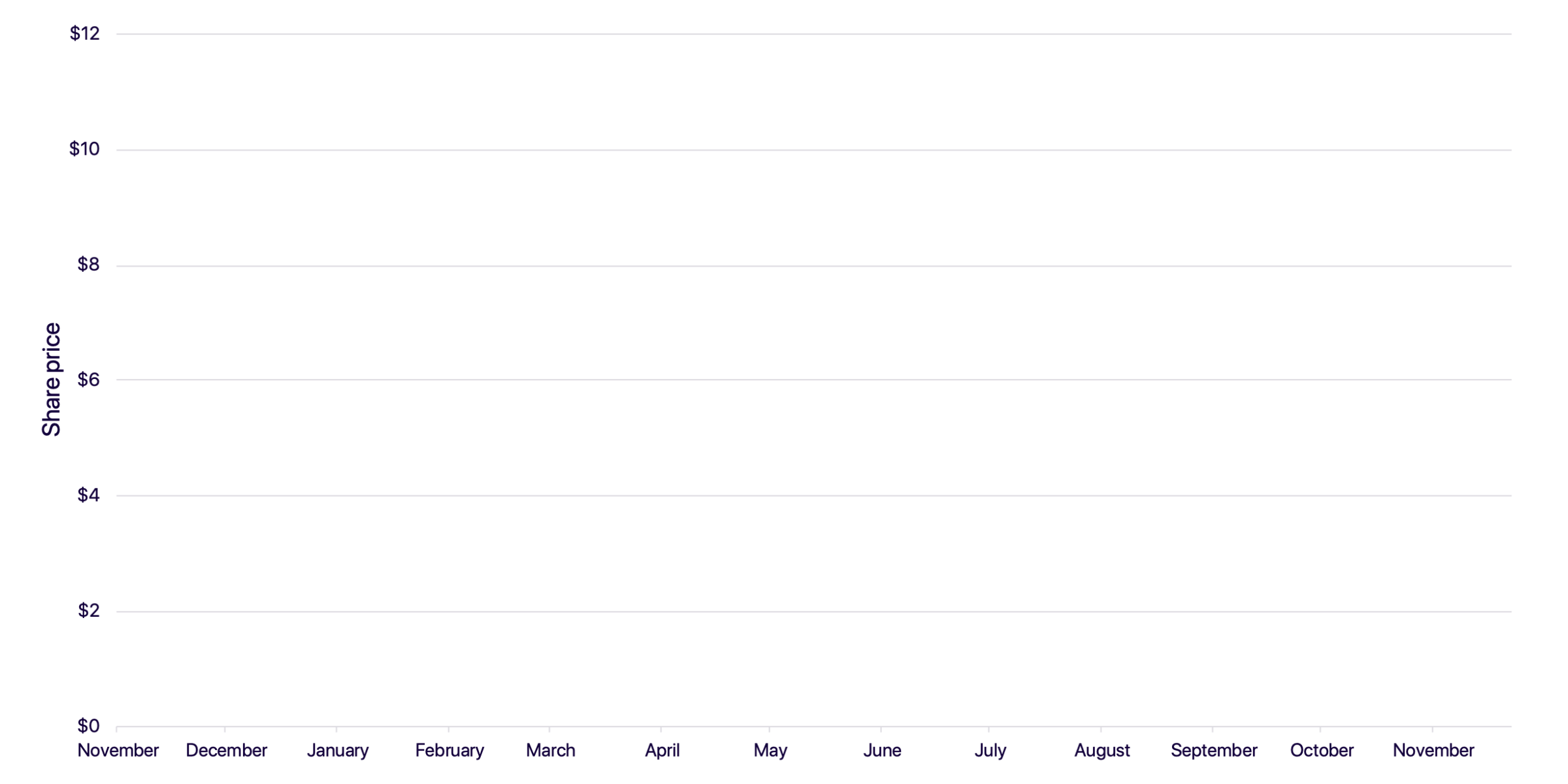Spaceship’s investment team went and met with the Kogan co-founder David Shafer last week.
Kogan is an Australian retail company with a rather ugly share price chart.
Check this:
ASX: KGN 1 year

But it’s also an incredibly profitable business.
Let’s go through why it’s still in the Spaceship Universe Portfolio.
The biz in a nutshell.
Kogan started in 2006 selling electronics exclusively online, but now it does quite a bit more than that.
The founders are Ruslan Kogan and David Shafer who went to high school together in Melbourne.
Ruslan Kogan started a company that bought TVs and electronics from cheaper countries (like Hong Kong and Singapore and the US), put their brand on them, brought them to Australia and sold them.
This is called “white labelling” or “private labelling”.
It’s been a profitable strategy and Kogan has managed to build scale and market share by undercutting its brick and mortar competitors.
People were pretty stoked on the whole system: Australians could buy cheaper smartphones and cameras and, as majority shareholders, Ruslan and David made a killing.
And after a while, once they had a solid customer base for their Kogan branded stuff, the likes of Sony, Apple and other well known brands began selling on the platform.
Given they never raised any venture capital, it’s been a pretty good Australian tech business story.
After the direct importing business was established, then they began to expand their strategy of white labelling products into services.
Rather than build these services from the ground up - and spend lots of money doing that - Kogan develops corporate arrangements with existing companies and white labels the product or service as Kogan.
So Kogan Mobile and Internet are actually Vodafone plans.
Hollard Insurance Company issues the general insurance policy for Kogan Insurance.
And Hannover Life Re of Australasia issues the policy for life insurance.
Kogan Health is a Medibank insurance policy.
Kogan Superannuation, announced last month, will be a Mercer superannuation product.
And the Kogan Money Credit Card, announced this week, is powered by Citi.
It’s a smart business model because it doesn’t cost Kogan anything to build or maintain the networks or products, it just takes care of the marketing (which is basically whacking the word Kogan on things) and distribution.
It looks like this:
I buy Kogan car insurance for $100. I receive a Hollard Insurance Company insurance policy, but with Kogan on the box.
Some of that $100 goes to Hollard and some of it goes to Kogan.
Hollard pays for the operation of the actual product, and is responsible for paying all claims.
Hollard are cool with this because Kogan goes out and finds the customers for them.
And Kogan gets money for a product it doesn’t have to maintain or run.
Better yet, if Hollard want to ditch Kogan, they may have to pay Kogan cash in order to “buy” the customers off them.
Then why the hectic selloff?
Despite the very profitable strategy of putting their “cheap and cheerful” brand on things and gathering an impressive amount of customers, Kogan’s share price has fallen sharply this year.
This is largely for two reasons:
● the Australian government extended Goods and Services Tax (GST) to imported goods worth less than $1,000, which were previously exempt from the 10 per cent tax; and
● both Ruslan Kogan and David Shafer have been selling their shares in big chunks.
Everyone knew that in the July just gone, the government was going to extend GST to anything imported from overseas that was worth less than $1,000.
Not having to pay that tax was a very powerful way for Kogan to gain traction in its early years because shipping cheap electronics in to hungry Australian customers was a dream.
Kogan didn’t have to pay GST because they bought Hong Kong or US stock, which attracted no GST, whereas the likes of JB Hi-Fi and Harvey Norman bought Australian stock so they did pay GST.
But the government was changing the laws and the impending tax meant those things were going to become 10 per cent more expensive.
The share price fell by a third and Kogan was brought in line with its other local competitors.
So this was in July.
That’s fine and from Spaceship’s investment team’s point of view, that doesn’t largely affect Kogan’s ability to do its business, especially as all its competitors have the same tax.
But the selling of the shares is what’s given the market a bit of a spook. Here is a timeline:
The company listed on the ASX in 2016 at $1.80.
And after the IPO Ruslan and David owned around 69.6 per cent of all the shares issued.
Then they offloaded a $20 million stake at $3 a share in August 2017.
Then another $23 million at $4.25 a share in October 2017.
And then they announced a new expansion into whitegoods and Mr Kogan said the whole sector is "ripe for the picking". And the stock jumped up 7.5 per cent.
And that night - the same day as that announcement - Kogan and Shafer tried to offload $100 million worth of stock.
Everyone freaked out because that was like 10 per cent of the company, and the share price plummeted.
The sale never went through because they couldn’t find a buyer for the price they wanted. But they did manage to sell half that order two weeks later.
It kind of doesn’t help that Ruslan Kogan bought a Toorak mansion around that time.
Then, after a very good year of revenue growth and share price appreciation, in June the two founders sold around 6 million shares at around $7.62, cashing in approximately $42 million.
(The guys didn’t say exactly how much the deal was worth).
And then in the September just gone they both sold around $40 million again.
The news around the GST implications and the optics of the founders cashing out heavily in their business caused a lot of investors to lose faith in the business.
Don’t these guys want to back their own business? Do they know something internally about the company that the market doesn’t know about?
The share price has slumped to $2.97 at close of markets on 26 November 2018.
The truth is always (probably) somewhere in the middle and in this case, it looks like two guys who have built a business over 12 years are ready to make some money off it.
The way Spaceship sees it, David Shafer and Ruslan Kogan have cashed in on some of the success of their business.
Both of them are still on the executive team and, combined, they still own 36.4% of the company. (According to Bloomberg data as at 26 November 2018).
While headlines can carry on about the founders jumping ship, our meeting with Shafer last week (where he explained the vision for Kogan) and the way we understand the business is growing, there doesn’t seem to be an overly strong bear case to get rid of the stock.
Enjoy your week.
ps. The Spaceship Universe Portfolio invests in Kogan.
Important! We’re sharing with you our thoughts on the companies in which Spaceship Voyager invests for your informational purposes only. We think it’s important (and interesting!) to let you know what’s happening with Spaceship Voyager’s investments. However, we are not making recommendations to buy or sell holdings in a specific company. Past performance isn’t a reliable indicator or guarantee of future performance.



